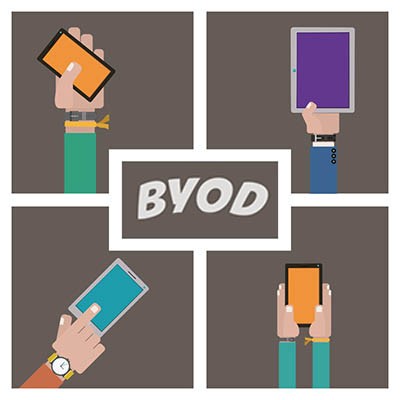With technology becoming more mobile, the way we interact with tech has changed considerably. Now that dial-up has evolved to broadband and cellular networks have dramatically improved, technology has allowed people to become more connected than ever. Your business can improve its communications and operations with the right mobile technology.
The Connection, Inc Blog
Let’s face it; running a business can be expensive, and taking any measures possible to mitigate those costs can have huge benefits for your bottom line. One way companies are minimizing costs is by implementing a Bring Your Own Device policy, or BYOD, to allow employees to use their own personal devices for work purposes. We’re here to help you do so without putting security at risk.
One of the most effective means for a business to shave a few dollars off its budget (and potentially boost employee engagement, for that matter) is to adopt something called a Bring Your Own Device policy—effectively, an agreement that allows their team members to access business-owned documents and files on devices they personally own to get their work done. While these policies have been shown to be very effective, they also need to be carefully considered so they can be adopted appropriately.
BYOD, or Bring Your Own Device, policies have proven to be a highly effective way for companies to save money. However, these policies need to address some of the shortcomings, potential costs and issues that comes with employees bringing and using their own devices could present to your business--not to mention security concerns.
Committing Time to Mobile Device Management
Mobile Device Management, or MDM, needs to be involved whenever there’s a BYOD implementation. There needs to be a designated contact in your organization to monitor your MDM software to ensure that your data isn’t being accessed by someone lacking the authorization to do so.
Unfortunately, this is often easier said than done. Monitoring your MDM solution can very quickly become a full-time task. Before you commit to a BYOD strategy, establish if you can spare the resources to properly maintain it.
Obtaining Support
If a company provides their workforce with devices, the company is in control of which devices they provide. The company can select a certain build of machine and standardize the company systems. This means that IT only has to know how to handle one or two types of machine, allowing them to do a better, faster job taking care of your systems.
BYOD can often make obtaining support more difficult and time-consuming, and thereby less cost-effective. This is because you suddenly have to contend with numerous kinds of devices and the various issues each can present. As a result, providing uniform company devices could ultimately total out to be less expensive than allowing employees to use their own, depending on the abilities of your employees.
Waste
We’ve all been there--we get something, determined to use it, and yet it is never used for its intended purpose. This phenomenon can be seen in many cases of BYOD implementation. An employee will be approved for BYOD--whether or not their duties would be benefitted by their using their own device in the first place--and never use it for work. As a result, their employer more or less begins to pay for the employee’s personal device.
Lack of Control
It wasn’t all too long ago that Apple released iOS 11, which came with a new ‘feature’ that could more accurately be called a vulnerability. The device’s control center provides a switch to turn Bluetooth and Wi-Fi on and off. However, it turns out that these switches don’t actually turn either off, opening a user to attack. Therefore, using a device with iOS 11 installed could leave your business vulnerable if it is part of a BYOD implementation.
Now, we aren’t saying that you shouldn’t utilize BYOD. We just want to make sure you are prepared to mitigate these concerns and get the most benefit out of your Bring Your Own Device policy. We can help make sure that you are prepared. Call The Connection, Inc today at (732) 291-5938.
Mobile devices are so common nowadays that you’ll likely encounter your employees bringing multiple devices to the office on a regular basis. Little do they know that everything they bring with them, from their Fitbit to their laptop, poses a security threat. Of course, the threat level from each individual device will depend on what it is exactly, but the point stands that the less you do about mobile device security now, the more danger your organization will be in down the road.
There are a lot of benefits to implementing a Bring Your Own Device policy for your business. Firstly, people will be able to use the devices that they’ve purchased, and have grown accustomed to, for work. Moreover, many times they can access company information with the use of easy-to-use mobile apps, providing them with more opportunities to be productive. In fact, many organizations that install a BYOD policy see the majority of their workforce work more, which creates more opportunities for revenue growth, and ultimately, higher profitability of the endeavor.
Smartphones, laptops, and Chromebooks empower today’s workforce to be more mobile, and employees are often the driving force behind this. Chances are, if your business hasn’t even begun to think about your mobile IT strategy, a percentage of your staff already has.
Last year, Gartner conducted a huge survey that concludes just that. Here are the stats:
- 8 in 10 of employees bring their personal mobile device to work.
- 37% of employees receive laptops from their employer.
- Only 23% of employees surveyed were given corporate-issued smartphones.
- Yet, 10% of employees given a work device don’t use personal devices as well.
- That said, only 20% of all employees who were given a work device were dissatisfied with it. Typically the satisfaction level is higher with smartphones compared to desktops and laptops.
- More than 50% of all employees who use smartphones for work use their personal device.
- 2/3 of employees use a personal device, whether it is a smartphone, tablet, or laptop, for work.
So what does all of this have to do with your data? Employers have worked hard to protect and centralize company information, and control access to files and email. Once employees add personal mobile devices to the mix, it adds a whole new layer of complexity.
So Really, What Are the Risks of Personal Devices?
If left unchecked, there are plenty of risks. This is why employers go to such drastic lengths to try and control mobile device use in the workplace; or, even prevent it altogether.
A lost smartphone or tablet could give someone access to company email, which might include sensitive client information, processes, passwords, and a whole lot of other data. A personal laptop that gets hacked or infected could bring the same risks, while spreading the infection onto your network. If an employee uses public Wi-Fi, even a novice could muscle their way into the data and get passwords, correspondence, and other information.
Even worse, if a disgruntled employee quits, they could have access to your contact lists, files, and everything else they had while employed. The trouble they can cause could keep you busy for a long time.
Let The Connection, Inc Help Devise your BYOD Strategy
A BYOD (Bring Your Own Device) strategy, also known as a mobile device management strategy, will protect your company’s data, as well as allow employees to take advantage of mobile devices and the many benefits they can bring to an organization. By crafting a thoughtful, well-documented plan for what’s allowed, what needs to be done, and what’s at stake, you can keep business moving quickly without hindering employees or your data. Plus, many of the key elements of a BYOD policy can drive even more innovation and collaboration.
Let’s talk about it. Give us a call at (732) 291-5938 and ask how we can protect your data while keeping your business mobile.
Bring Your Own Device, or BYOD, has grown significantly in the business environment. You might even have a couple practitioners of BYOD in your own office; people who use their personally-owned devices for work purposes. However, just like any potential benefit, it also has drawbacks that need to be considered. How can you implement BYOD without experiencing too many of its drawbacks?
 Mobile devices have taken the workplace environment by storm, and you’d be hard-pressed to find anyone who doesn’t use their smartphone, laptop, or other device for work purposes. This trend, called Bring Your Own Device (BYOD), helps employers spend less on new solutions, but it also presents a risk that needs to be managed: the Internet of Things (IoT).
Mobile devices have taken the workplace environment by storm, and you’d be hard-pressed to find anyone who doesn’t use their smartphone, laptop, or other device for work purposes. This trend, called Bring Your Own Device (BYOD), helps employers spend less on new solutions, but it also presents a risk that needs to be managed: the Internet of Things (IoT).
 Mobile devices are changing the way that businesses look at the workforce, but one of the main draws (and possibly detriments) is how the industry continues to change rapidly as new solutions are made available. In order to maximize your business’s efficiency with mobile devices, it’s important to consider these three trends shaping the way that organizations handle modern mobile device management.
Mobile devices are changing the way that businesses look at the workforce, but one of the main draws (and possibly detriments) is how the industry continues to change rapidly as new solutions are made available. In order to maximize your business’s efficiency with mobile devices, it’s important to consider these three trends shaping the way that organizations handle modern mobile device management.
 A trend that’s taking the office by storm is BYOD, or Bring Your Own Device. These policies entail workers bringing their own devices to the office and using them for work-related purposes. While this opens up many avenues for enhanced productivity and efficiency, being too laissez faire with your BYOD policy could instigate some problems later on, primarily in the security field.
A trend that’s taking the office by storm is BYOD, or Bring Your Own Device. These policies entail workers bringing their own devices to the office and using them for work-related purposes. While this opens up many avenues for enhanced productivity and efficiency, being too laissez faire with your BYOD policy could instigate some problems later on, primarily in the security field.
 Employees bringing their own mobile devices into the workplace (BYOD) is one of the hottest business technology trends. BYOD has been shown to increase productivity, but when it’s implemented improperly, it can leave your business vulnerable to security threats. How do you motivate employees to stick to your BYOD policy in order to ensure the safety of your company’s data?
Employees bringing their own mobile devices into the workplace (BYOD) is one of the hottest business technology trends. BYOD has been shown to increase productivity, but when it’s implemented improperly, it can leave your business vulnerable to security threats. How do you motivate employees to stick to your BYOD policy in order to ensure the safety of your company’s data?








